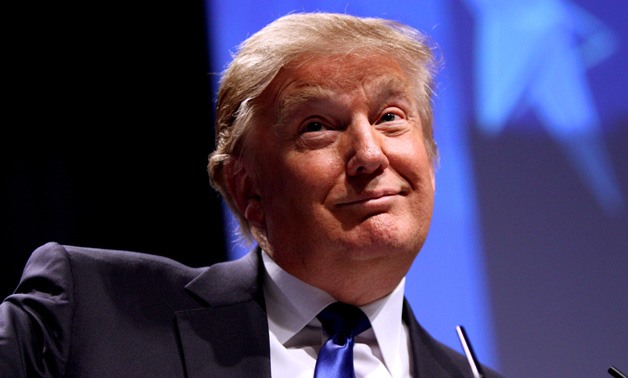
Creative Commons via Wikimedia Commons
Jerusalem, May 17, 2017 (AFP) - Israel sought Wednesday to contain the fallout from Donald Trump's sharing of its intelligence with Russia after the move cast a further shadow over the US president's visit to the country next week.
Israeli Prime Minister Benjamin Netanyahu and Trump spoke by phone on Tuesday afternoon, a spokesman for the premier's office said, while stressing that they only discussed next week's trip during the 20-minute conversation.
But as the news emerged that Israel was the initial source of the intelligence provided to Russia, other Israeli officials spoke of their commitment to continuing security cooperation between their country and Washington.
Israeli Defence Minister Avigdor Lieberman said security ties would continue to be "unprecedented" in scope.
But he made no mention of Trump divulging intelligence to Russia that a US administration official said had originally come from Israel.
"The security relationship between Israel & our greatest ally the United States, is deep, significant & unprecedented in volume," Lieberman wrote on his Twitter account.
The relationship "is unprecedented in its contribution to our strength. This is how it has been & how it will continue to be," he added.
Intelligence Minister Yisrael Katz said he had "complete confidence in the American intelligence community".
Netanyahu's office had not responded to requests for comment on the intelligence sharing.
The United States is Israel's most important ally, providing it with more than $3 billion in defence aid each year.
The story grabbed the front pages of every major Israeli newspaper, with the exception of the pro-Netanyahu freesheet Israel Hayom.
The Washington Post reported late Monday that Trump revealed what it said was highly classified information on the Islamic State group during a meeting last week with Russian Foreign Minister Sergei Lavrov and Moscow's Washington ambassador Sergey Kislyak.
It said that Trump told Lavrov about a specific Islamic State group bomb threat.
A US administration official confirmed to AFP on condition of anonymity that the original intelligence came from Israel, which was initially reported by the New York Times.
Trump took to Twitter to insist he had the "absolute right" to share "facts pertaining... to terrorism and airline flight safety" with Russia.
But the intelligence scandal could corrode trust among allies who shared classified information with the United States on the understanding that it will go no further.
"There's no question that the Israeli confidence has been shaken that some of the most sensitive information they share with us will be properly safeguarded," Dan Shapiro, US ambassador to Israel under Barack Obama and now a senior fellow at the Institute for National Security Studies think tank in Tel Aviv, told AFP.
"The relationship's too important to both sides for that sharing to end, but I expect it to have a chilling effect in the short-term on what the Israelis will share until their confidence has been restored that it will be properly safeguarded."
Amnon Sofrin, a former senior official in Israeli intelligence agency Mossad, said "if this really happened and there is some reflection about the source... it can put into risk the source and may cause some damage to our activities."
However, he said "I don't believe that such an event will cause any big damage," adding that it would not be "a disaster".
Israel's top-selling newspaper Yediot Aharonot reported in January that Israeli intelligence officials had been told in a meeting with US colleagues that "Israeli intelligence information, methods of operation and sources" could leak from a Trump administration seen as having close ties to the Kremlin.
The paper said the fears were compounded by Russia's links with Israel's arch-foe Iran.
"The Israelis who attended the meeting said that the Americans advised them not to expose any sensitive sources to members of the Trump administration, lest that information reach Iranian hands, until it becomes clear that Trump does not have a compromised relationship with Russia," the paper reported at the time.
Controversy also erupted over US policy toward Israel earlier in the week over the White House's approach to the ultra-sensitive status of Jerusalem.
Debate over whether the United States should move its Israel embassy from Tel Aviv to Jerusalem again flared, while a separate row over whether the city's Western Wall -- the holiest site where Jews can pray -- belongs to Israel also caused waves.
Both issues provoked criticism of Trump's White House in Israel as preparations intensified for his visit to the country and the Palestinian territories on May 22 and 23.

Comments
Leave a Comment